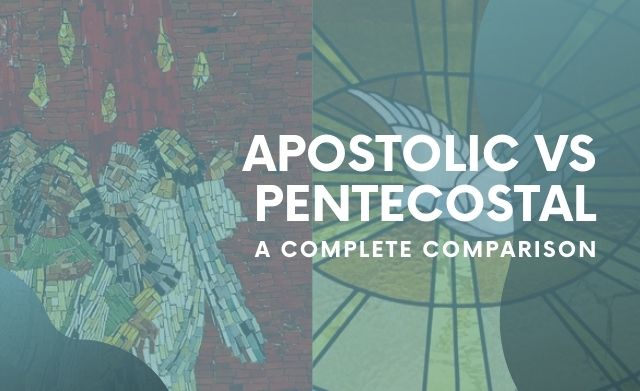
There are thousands of Christian denominations around the world. The difference between apostolic and pentecostal is in their beliefs and practices. This article aims to discuss and differ between two popular denominations that emerged from the same root.
Apostolic initially was a part of the pentecostal movement that started in the late 19th century. However, in the early 20th century, apostolic churches split from the Pentecostal churches over some conceptual disagreements.
The churches that walk to the way of the apostles are known as the apostolic churches. On the other hand, Pentecostal churches believe in experiencing God through baptism with the Holy Spirit. They practice speaking in tongues.
Table of Contents
Comparison chart
| Difference | Apostolic | Pentecostal |
| Orientation | Apostolic | Restorationist |
| Meaning | Apostolic means sent from god. | Pentecost is a Hebrew word meaning Fifty. |
| Believe | Apostolic believe in the teachings of Jesus and his apostles. | Pentecostal believes in the baptized in the Holy Spirit as a direct experience of God. |
| Emergence | The first apostolic church was established in 1911, and as a separate movement, apostolic churches expressed themselves in 1916 | A movement that started in the late 19th century. |
| Trinity | Apostolic churches do not believe in the trinitarian doctrine. | Most of the Pentecostal churches have faith in the Trinitarian concept. |
What is Apostolic?
Jesus Christ chose twelve men to be His apostles. They were the disciples conceiving the teachings of Jesus Christ. The Twelve Apostles were Simon Peter, John, Matthew(Levi), Andrew, James the Great, Philip, Nathanael Bartholomew James, Son of Alpheus, Thomas, Simon the Zealot/the Canaanite, Judas the Zealot/Thaddeus, and Judas Iscariot /or replaced by Matthias.

So, apostolic believe in the Apostles’ teachings and follow the churches’ rules established in the apostolic age. The Roman Catholic Church, the Orthodox Catholic Church or the Eastern Orthodox Church, the Oriental Orthodox Churches, the Eastern Rite Catholic Churches or the Oriental Catholic Churches, Assyrian Church of the East, the Ancient Church of the East – these various churches are known as the Apostolic churches.
The apostolic movement is a branch of the Pentecostal movement that started in the first decades of the 20th century. The Apostolic Church of Pentecost (ACOP) is the Church for apostolic Pentecostals. However, not all pentecostal ministries are apostolic.
The missionaries of the Church refer to themselves as apostles. Other churches have a top to bottom organizational structure. But ACOP local churches are autonomous. The headquarters of the Apostolic Church of Pentecostal (ACOP) is in Calgary, Alberta, Canada.
Apostolic Pentecostals are very strict believers. They do not smoke tobacco or drink alcohol like other Pentecostals. Generally, they do not watch television or movies. Apostolic Pentecostal women wear long dresses and do not cut their hair or wear makeup.
Apostolic beliefs
Apostolic Pentecostals believe that the Bible is the word of God. They are non-Trinitarian. The apostolic pentecostal split from other Pentecostal churches in 1916 over the dispute of trinitarian concepts and expressed as an individual denomination. They think that God, Son, and the Holy Spirit are not three different persons but three distinct titles of one: Jesus.
Apostolics believe in the virgin birth of Jesus, and he is the only savior of humanity. It is the duty of all to listen to his gospels and turn to be an adherent of Christ for redemption. They trust in a spiritual world, including God, Angels, Satan, Heaven, and Hell. They uphold the personal return of Jesus Christ concept, the final judgment and believe in communion, and baptism by immersion.
What is Pentecostal?
Pentecostalism is a movement risen from the late 19th century radical evangelical revival movement in the United States. It is a protestant Restorationist movement. The majority of the pentecostal churches are Trinitarians. They believe in Charismatic expressions like Speak in Tongues, divine healing, et cetera.

In the Bible, Acts: 2:1 says, “And when the day of Pentecost came, they were all together in one place.” The term pentecostalism came from the word Pentecost. Pentecost is a Hebrew word meaning fifty. This fifty refers to the days of Pentecost that happened between the third day after the crucifixion of Jesus to the next fifty days.
Pentecostal beliefs
Pentecostals have evangelical beliefs. The evangelical faith and practice contain Sovereign authority of the Bible; The Trinity, Worship, Salvation, Sanctification, The good works, The end of time.
The sovereign authority of the Bible: The Bible is inspired by God, and they place it as the sovereign authority in the Christian faith.
The Trinity: The majority of the Pentecostal churches believe in the trinity of God: The Father (Almighty God), the Son (“Only Son” Jesus Christ), and the Holy Spirit. Oneness Pentecostals believe that God owns the Father, the Son, and the Holy Ghost.
Worship: They worship only God and restrain from any idolater practice.
Salvation: There is good news for the evangelicals that one must endure punishment in hell for one’s sin, but by faith in Jesus and (not by works), one can get salvation and go to heaven. The word ‘Evangel’ comes from the Greek word ‘Euággelon’ (Ευάγγελον) means ‘good news.’
Sanctification: Sanctification is the process by which one frees oneself from sin and becomes pure and holy after the new birth.
The good works: The good works are the outcome of salvation. The good works are evangelism, service in the Church, and to charity.
The end of time: The last judgment by God is the end of time.
Baptism and Speak in Tongues: Pentecostals are baptized in the Holy Spirit’s presence or ‘power from above,’ and at this time, they speak in an unknown tongue called Speak in Tongues or Glossolalia. It is physical evidence of a message from the Holy Spirit.
Divine healing: Pentecostals believe in divine healing. In the first decades of the Pentecostal movement, they even did not go to physicians and did not take medicines.
Oneness Pentecostals: Most Pentecostal churches are believers in Trinity. But Oneness Pentecostals are Non-Trinitarian Pentecostals. The Apostolic Church of Pentecost (ACOP) and the United Pentecostal Church International are oneness Pentecostals.
The key differences between Apostolic and Pentecostal
- Apostolic means the one sent by God; apostolic churches baptize their followers in the name of Jesus. The Pentecostal experience God by baptizing its followers in the name of the Holy Spirit.
- The term apostolic arose from the apostles of Jesus. Conversely, the term pentecostal emerged from the day of Pentecost.
- Apostolics are the followers of the teachings of early apostolic churches. Pentecostals are Restorationist Protestants who believe in the teachings of Pentecost day.
- One significant difference between apostolic and pentecostal is that the Apostolic pentecostal are non-trinitarian. On the other hand, the majority of the pentecostal churches believe in the trinity concept.
- Although the Pentecostal movement began in the late 19th century, the apostolic split itself in 1916 and emerged as an individual denomination.
Frequently asked questions (FAQs):
What is the difference between Pentecostals and Evangelicals?
Pentecostals and Evangelicals – both are protestant Christians. The evangelical faith and practice contain the Sovereign authority of the Bible, The Trinity, Worship, Salvation, Sanctification, The good works, The end of time. Pentecostals are Charismatic Evangelicals. They believe in Charismatic expressions like Speak in Tongues, divine healing, et cetera.
Is the Church of God and Pentecostal the same?
The Church of God is a Pentecostal church.
Can Pentecostals wear pants?
United Pentecostal churches do not allow slacks (pants, trousers, and pajamas) for women. Men can use slacks.
Is ‘Speaking in Tongues’ a real language?
Speaking in Tongues is not a real language. It has no linguistic meaning.
What does all this have to do with same-sex marriage and Kim Davis?
The majority of Pentecostal churches are not supporters of same-sex marriage. Gay Apostolic Pentecostals are oneness Pentecostals who align themselves with LGBT (Lesbian, Gay, Bisexual, and Transgender) movements.
Kimberly Jean Davis was a county clerk at Rowan County, State of Kentucky, USA. In August 2015, she defied a federal court order to issue marriage licenses to same-sex couples. She was defeated in an election contest in 2018 and vacated the office. She identified herself as an Apostolic Pentecostal.
What religion wears long skirts and long hair?
A Pentecostal woman needs to wear skirts or a dress like this and not cut their hair and not wear makeup.
What religion requires you to wear a skirt?
Pentecostal women require not wearing slacks. So a Pentecostal woman needs to wear skirts or a dress like this.
Do the brethren drink alcohol?
Pentecostals do not drink alcohol or do not smoke.
Conclusion
While it comes to the difference between apostolic and pentecostal churches, these denominations have disagreements on concepts like the trinity or the root of their teachings.
The ministry of Jesus teaches unity among the followers of Christianity. But, the reality is a bit harsh. Currently, there are thousands of denominations and churches of Christianity around the globe. Some groups are divided based on perceptions, while some pursue different practices.

Craig is a full-time academic and research-based article writer from California. A trained content creator who started his career as a column writer for local magazines and newspapers. His works have been published on many renowned online platforms.

Pentecostal women can’t wear pants? My fife has for many years. We are FourSquare… get it right and don’t over generalize dude.
It’s said here Pentecostals are majority Trinity, but emphasis the events of Acts 2:38. Where believers were instructed to baptize following the “Apostolic” formula.